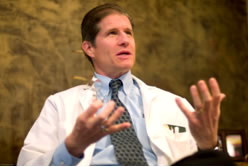Several years ago, at the Clinical Breast Care Project’s (CBCP) offsite retreat with the physicians from Walter Reed Army Medical Center, our biomedical informatics group had prepared a demonstration for the CBCP’s Scientific Advisory Board, a group of distinguished scientists, breast cancer consultants and physicians.

COL Craig D. Shriver, MC Director, Clinical Breast Care Project (CBCP), Program Director & Chief of General Surgery, Walter Reed Army Medical Center
As the 7:00 PM meeting time approached, it was obvious that there was not going to be a quorum present to start the formal meeting. The two additional members had called in and we sat waiting patiently for the remainder of this august body to join us; fifteen minutes passed, then twenty and finally at about 7:25 PM, the group burst apologetically into the conference room to begin the call.
In case you’re wondering what would have caused such a delayed response from an otherwise very prompt group of individuals, it was the introduction provided by the biomedical informatics group of how this data repository’s capabilities could be explored. The advisory group was so captivated by the power of this tool that they literally became lost in the excitement of the demonstration.
This form of science was fascinating to me, because having trillions of pieces of data available from thousands of women allowed the queries to be guided by the data itself. When this power was coupled with the normal questioning generated by the intellectual curiosity of the individual scientists, the outcomes were beyond fascinating.
For example, you could ask the question, “How many of you drink coffee?” The thousands of participants whose biopsies – both malignant and benign – were being stored in the tissue repository at our research institute had agreed to answer over 500 demographic questions relating to their very personal and now anonymous lives. A graph appeared showing the proportion of women who were coffee drinkers. When I then asked, “How many cups a day do you drink?”a new graph appeared with that information as well. My final question was, “How many of you were diagnosed with breast cancer?” This resulted in an interesting fusion of information. The women who consumed the most coffee had the least amount of breast cancer. Of course, that general assumption needed to be researched, confirmed and proven in numerous ways, but there it was, way back in about 2005.
A report that touched on this topic was released during the second week of May, and it was fascinating. It was a Harvard study that followed almost 50,000 male health professionals for more than two decades. Over 5,000 of the participants got prostate cancer – 642 of them the most lethal form. “For the men who drank the most coffee, their risk of getting this bad form of prostate cancer was about 60 percent lower compared to the men who drank almost no coffee at all,” says Lorelei Mucci, an epidemiologist at the Harvard School of Public Health and an author of the study. The same group reported about a 50 percent reduced risk of dying from prostate cancer among men who took two or three brisk walks a week. As a part of our funding, similar studies performed by the Preventative Medicine Research Institute under the direction of Dr. Dean Ornish also confirmed this exercise theory of risk reduction for prostate cancer.
The new study shows that a 60 percent reduction in risk of aggressive prostate cancer requires at least six cups a day. However, men who drank only three cups a day still had a 30 percent lower chance of getting a lethal prostate cancer, and that’s not bad. Earlier research also suggests coffee reduces the risk of diabetes, liver disease and Parkinson’s.
But here is best part of this story. Just last week, Swedish researchers reported that women who drink at least five cups of coffee a day have nearly a 60 percent lower risk of a particularly aggressive breast cancer that doesn’t respond to estrogen.
Epidemiologist Mucci says more research is needed before officially urging people to drink coffee for its health benefits. Meanwhile, she says, “there’s no reason not to start drinking coffee.
So, all of these years later, the National Cancer Institute is using about 200 of these CBCP biopsies from that same tissue repository to map the Human Breast Cancer Genome, and everyday new reports are emerging that confirm the value of this research. All of this from a little coal mining town in Western Pennsylvania – the location of the research institute and hospital where I served as President and CEO – just three seconds in air miles from where Flight 93 went down.
Now that’s a story.





